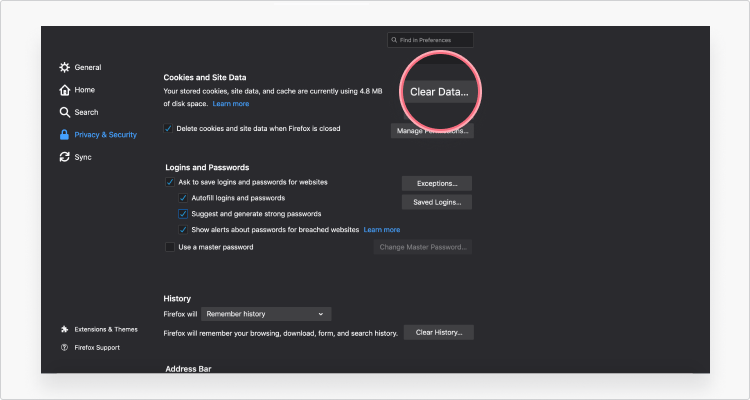

- CLEAR BROWSING DATA FIREFOX EXTENSION INSTALL
- CLEAR BROWSING DATA FIREFOX EXTENSION FULL
- CLEAR BROWSING DATA FIREFOX EXTENSION DOWNLOAD
People who didn’t download the extensions may still have been affected. “For example, I could instantly see what employees across thousands of companies were working on in real time,” he says. “When people share documents, they often send each other unique URLs,” Jadali says.“People assume those URLs are safe, but they’re often accessible to anyone who has the link.”Īnd, Jadali says, even the titles of files and web pages can be very revealing. The extensions collected user data by capturing the title and URL, or web address, for every page a user visited or clicked on-including those that aren’t typically accessible to the public. No other browsers were apparently affected, Jadali says. Both companies say the practices described in Jadali’s report violate their policies.

CLEAR BROWSING DATA FIREFOX EXTENSION FULL
His report, titled DataSpii, has the full list.Īll the extensions have been remotely removed from or disabled in consumers’ browsers and are no longer available for download, according to representatives from Google and Mozilla, the organization that operates Firefox.

CLEAR BROWSING DATA FIREFOX EXTENSION INSTALL
He was able to see such sensitive information as people’s medical prescriptions, personal financial data, and travel itineraries.īrowser extensions-also known as plug-ins or add-ons-are small apps that consumers can install to run alongside their browser for additional functionality.Īccording to Jadali, the extensions included apps with hundreds of thousands to millions of users, including FairShare Unlock, HoverZoom, and SpeakIt, along with some extensions with just a handful of users. “I didn’t believe it at first,” Jadali says. This data was then shared with the data broker Nacho Analytics, where it could be purchased for as little as $10 to $50, according to Jadali, whose report was first described in Ars Technica. The extensions collected a host of information that wasn’t authorized by either browser, exposing not only complete browsing histories but also access to files such as tax returns, medical records, credit card information, and other highly sensitive data, according to a report by Sam Jadali, an independent researcher who discovered the problem.


 0 kommentar(er)
0 kommentar(er)
